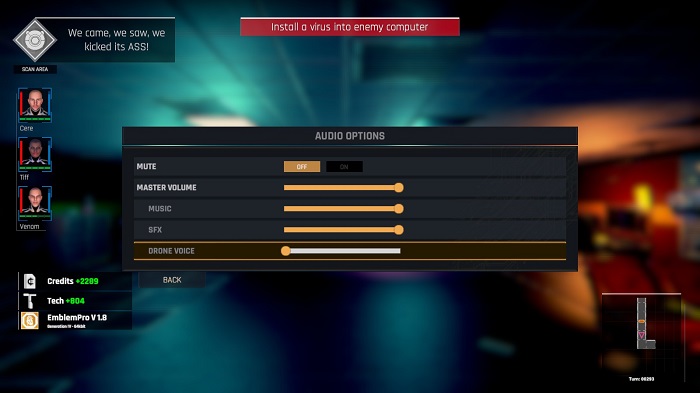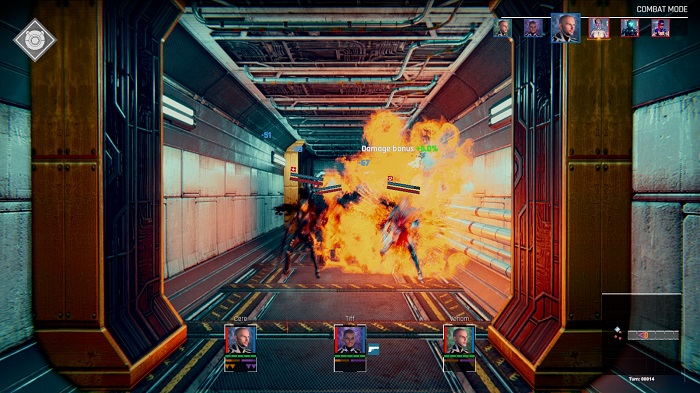Subjective:
Developer RuneHeads and publisher 1C Entertainment present Conglomerate 451 for review. Conglomerate 451 is a first-person role playing game with a cyberpunk twist. The player controls a squad of clones can be outfitted with various robotic enhancements and fight an assortment of opponents in turn-based combat. The player may build up their squad to reclaim the streets from various corporations making life hell for the average citizen.
Objective:
Conglomerate 451 is one of many first-person RPGs to grace gaming recently, like the Etrian Odyssey or Legend of Grimrock games. The cyberpunk flair is entirely Conglomerate 451‘s though, and there’s a good degree of customization in how the various clones can approach battle. It will take a little while to figure out what each status does and how some effects work as there’s little on-screen indication about positives or negatives. There’s plenty of numbers thanks to the quick combat that allows players to slot each of their three party members’ abilities into four spaces and attack enemies on the map. It’s difficult to get lost thanks to the handy automapping system, so the game becomes a matter of keeping your squad alive, figuring out a way to approach enemy groups from behind, and besting them in combat while whittling away the hold of each corporation on the different sectors.

Assessment:
It’s been a long time since I played a decent RPG and was in the mood for something like Conglomerate 451. The introduction, which involves a bit of misdirection and solid example of the different abilities available to you, was a promising start. The problem begins after that solid introduction when I slowly realized that Conglomerate 451 basically spills its full load of gameplay upfront and spends the rest of its time providing a lot of numbers but not much depth.
Conglomerate 451 hides its shallow gameplay well by overloading the player with previews of the many upgrade trees that you can follow. There are several lines of research, which each have their own branching upgrades to purchase like new arms and legs, chips for those arms and legs, shields, and so on. It feels like it should be a min/max paradise for people who want to get into the nitty gritty of their squad customization. However, around the twentieth or so encounter with my crew, I realized that there was no significant derivation from the attacks I started the game with. This didn’t improve when my battle numbers reached triple digits as almost every single fight involved boosting my attack power and using area-of-effect abilities to grind enemies down.
There’s a wealth of options but no real need to experiment. This is unlike a contemporary series like Etrian Odyssey, where the player has to think creatively about different party compositions and how their abilities will play off of one another with lots of trial and error. Conglomerate 451 never gets out of that first gear of simply having options and into a scenario where I had to gird down to explore those options to overcome a challenge. Compounding the issue is item bloat, since all the customization options have their own equipment loadouts, and I found myself combing through stacks of nearly identical looking items to make a number go up.

Conglomerate 451‘s presentation fares a bit better with one exception so annoying I’d like to issue this warning to developers. Please stop including smart alack robots in your world. The squad has a drone following it that quotes extensively from other games like Baldur’s Gate 2, talks about its TETRIS scores, and constantly reminded me to recharge my shields. The latter comment is what broke me and sent me on a quest to find out if I could silence the drone. Mercifully, I could, but not after the drone repeated – three times with no break – that they couldn’t help but notice I needed to recharge my shields. When my shields were barely dented between my three squad members.
The visuals consist of serviceable but indistinct cyberpunk motifs that’s heavy on the cyber and barely punk. There’s plenty of laser ninjas, techno skirts, robo dogs, and other typical RPG baddies that have a bit of technology bolted onto them for flavor. Nothing stands out save the soundtrack, which managed to bop along with nice droning flourishes and a hefty helping of palm-muted guitar. I didn’t enter a state of flow when Conglomerate 451, but the whole experience at least passed by with minimal annoyance.
Game was played and reviewed using a provided review code of Conglomerate 451 for the Steam platform on the PC.

The Review
Conglomerate 451
Aside from providing the poster child for shutting up all future sarcastic robot companions - Conglomerate 451 is a shallow and inoffensive RPG. There's little to distinguish it from its competition and even less to actively enjoy after the first half hour. If you're desperate for something tinged with cyberpunk and want to play a RPG there are better options like the Shadowrun series. This one you can safely skip.
PROS
- Great music adds ambiance in ways the "tech plus thing" design does not.
CONS
- The sarcastic drone interjects itself into the soundtrack so often that muting it is the only way to get through Conglomerate 451 without ripping out your speakers in a rage.
- An overabundance of customization options conceal that they do little to deepen the gameplay.



